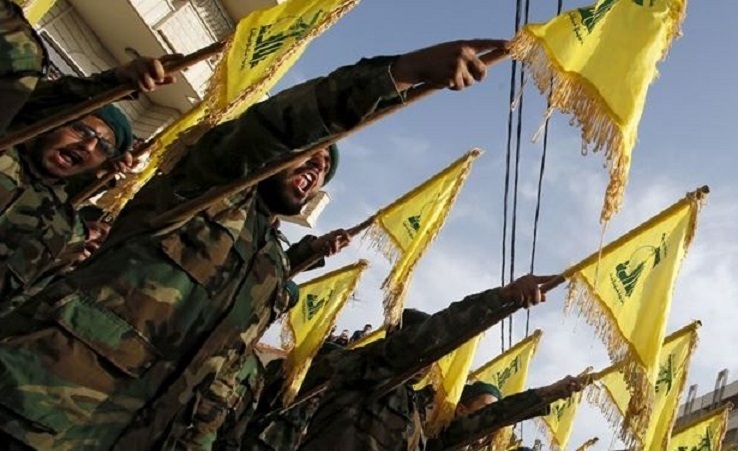Getting your Trinity Audio player ready...
Iran-backed terror group Hezbollah is running out of funds to finance its continued assault on Israel amid the IDF’s deepening operation in Lebanon, researchers told U.S.-based outlet Voice of America (VOA).
The news outlet reported on Friday, citing authorities in the U.S. and Lebanon, that the terror group’s source of funds is Al-Qard al-Hasan (AQAH), a quasi-banking group operating in Lebanon without a proper license.
Israel's Meir Amit Intelligence and Terrorism Information Center (ITIC) told VOA the terror group funded the financial body in 1982 as a charity fund providing loans to needy, mainly Shi’ite, Lebanese citizens. The body has since grown into a major financial player across Hezbollah-dominated Lebanon including inside of Beirut and the terror group’s Dahieh district.
The outlet added that the U.S. Treasury Department imposed sanctions on AQAH in 2007. In a 2021 announcement about further sanctions targeting AQAH employees, the department said the institution had accumulated around half a billion dollars.
According to MTV Lebanon, one of the country’s major TV networks, Israel's initial airstrikes on Hezbollah targets in Beirut’s Dahieh in late September dealt a significant blow to AQAH.
On September 30, an Arabic-language report from MTV Lebanon stated that the Israeli strikes had targeted Hezbollah’s “cash storage centers, including a large part of the AQAH vaults,” resulting in what the network described as a “financial crisis” for the group, according to the report.
3 View gallery


A statue of Iranian General Qassem Soleimani, former head of Iran's Quds force, stands in front of a branch of the Hezbollah-run Qard al-Hassan Association, in Ghobeiry, Lebanon
(Photo: AP)
Hilal Khashan, a political science professor at the American University of Beirut, told the outlet that Israel “destroyed” most of AQAH’s branches during the strikes. “Hezbollah is facing a very serious financial problem. They are unable to pay rank and file members who have fled their homes and need to feed their families,” he said.
The U.S. Treasury Department's 2021 statement regarding sanctions on six AQAH employees revealed that these individuals had used personal accounts at licensed Lebanese banks to move over $500 million to and from AQAH over the past decade. This arrangement allowed AQAH access to the global financial system through the employees’ personal accounts at Lebanese banks, the report added.
David Asher, a former U.S. Defense and State department official who worked on targeting Hezbollah’s global drug trafficking and money laundering operations, told VOA that the group is in “deep trouble” as it also loses access to the Lebanese banking system.
“I’m hearing from Lebanese bankers, including Hezbollah financiers, that Lebanon’s wealthiest bankers who can afford to fly have fled to Europe and the Gulf, fearing they could be targeted next by Israel for helping Hezbollah,” Asher, now a senior fellow at the Hudson Institute in Washington, said.
3 View gallery


A man on a scooter passes a branch of the Hezbollah-run Qard al-Hassan Association, in Beirut, Lebanon
(Photo: AP)
“These Lebanese bankers, most of them billionaires, see the wind is blowing against Hezbollah, so they are not going to let it take millions of dollars out of their banks, which still have cash despite being bankrupt on paper,” he added. “They know that if they do, Israel probably will eliminate them, too.”
Asher and Khashan also pointed out that another funding source for Hezbollah has dried up: cash deliveries on planes flying to Beirut’s airport, mainly from the group’s Iranian patron.
“I’ve heard from my Israeli counterparts that the Iranians are scared to send money to Lebanon right now because Israel is threatening to target flights into Beirut. The Israelis are warning they will target flights full of money, not just weapons,” Asher said.
Khashan told the outlet that Iran previously arranged regular flights from Tehran to Beirut to smuggle cash to Hezbollah, bypassing Lebanese government customs. “Since Israel escalated its attacks on Beirut’s southern suburbs, the Lebanese government has asserted more control over the airport, and now there is no cash flow to Hezbollah,” he said.
Strike in Beirut's Dahieh district
Lebanese Public Works and Transport Minister Ali Hamieh told APF last week that Beirut airport “is subject to Lebanese laws and to the scrutiny of various relevant departments and security agencies.” He added that any plane carrying weapons must receive approval from the Lebanese army and be licensed by his ministry.
In a Thursday report, Saudi outlet Al Arabiya cited a Lebanese army source saying the army and other security agencies have been “scrambling” to establish control over the airport by initiating cargo inspections to verify declared contents.
Despite the lack of cash, Khashan told VOA it was unlikely Hezbollah's operatives would halt their fight against Israeli forces anytime soon.
“Keeping up the fight depends more on the availability of food and ammunition,” he said. “When your fight is motivated by religious zeal, you have more fundamental issues to worry about than the availability of cash.”
Get the Ynetnews app on your smartphone:






